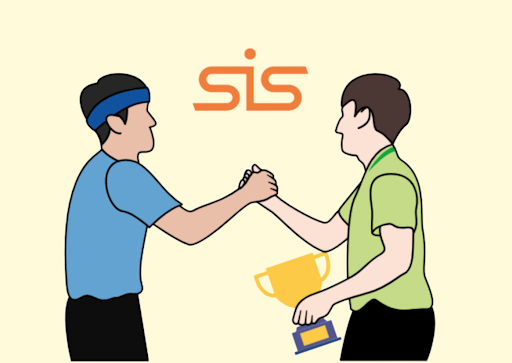Despite numerous victories by SIS sports teams decorating and marking this year’s varsity sports season as a success, the issue of sportsmanship has challenged this positive characterization. With accounts of our varsity teams displaying acts of unsportsmanship-like conduct.
After remarks from Vice Principal Chris Del Vecchio during the senior meeting about how SIS athletes present themselves on the court, sports captains and coaches alike were encouraged to display more friendly behavior towards opposing teams. This sentiment deeply resonated with particular players who experienced this sportsmanship problem firsthand.
“Can we call it a win if we aren’t acting like winners?” Winston Chen (11), varsity volleyball setter, said. “We do some things that others classify as unsportsmanship—like conduct in the volleyball team: we yell at our opponents and attempt to make difficult plays to close the point gap. I can understand how this could raise concerns, and these are things we can definitely improve on.”
The lack of sportsmanship that SIS players displayed was noted by the other teams, with some teams even openly expressing their discontent. This week, the practices were marked with a stark difference in attitude, with team captains emphasizing the importance of courtesy during games.
“A varsity player isn’t someone who just plays at a varsity caliber,” Joonho Kim (11), varsity golf captain, said. “They should be remarkable players both on and off the court. Being able to shoot well, hit a ball hard, or putt with great accuracy doesn’t mean anything if you carry yourself poorly.”
Sportsmanship is undeniably an integral part of being an athlete but, recently, this quality seems to be fading into a secondary topic. The current way varsity athletes are selected is through a series of tests to gauge their proficiency with the sport, with little to no emphasis on the personality or character traits of the students themselves. With this mechanical system at play, it is naive to expect a perfect lineup of respectful players. Hence, many coaches have taken the initiative to correct this behavior within their respective teams.
“While I believe that the SIS boys volleyball team means well, at times I think that they could be more sportsman-like; when we’re winning by a lot, we shouldn’t be antagonizing the other team by doing jump serves or saying bad things to them,” Glen Monaghan, boys varsity volleyball coach, said. “I’ve had to bench two students as a result of their lack of sportsmanship on the court.”
Amid the burgeoning demand for action, some athletes are left questioning whether the concerns over poor sportsmanship are even justified.
“I would say the SIS tennis varsity team is one of the most sportsmanlike and fair playing teams in KAIAC,” Brian Ji (11), varsity tennis captain, said. “KAIAC tennis runs on a self-call system, meaning there are no umpires and the players themselves judge whether balls are in or out. Some players gain an advantage from this rule by ‘faking’ line calls to win points. I’ve seen and played against many of these players in other schools but more importantly, I have rarely seen an SIS tennis player do such a thing.”
Although the athletic community at SIS is divided over the issue of fair play, all parties involved seem to understand sportsmanship’s integral place on the court. Moving forward, additional efforts are needed to ameliorate the current status of the entire varsity sports program like placing more emphasis on the overall character of the athlete rather than disproportionally prioritizing their athletic abilities.


